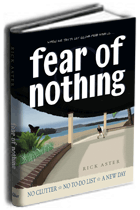Many people feel overwhelmed on a regular basis. It’s a familiar pattern all of us have seen and most have experienced at least once. Unfortunately, when people try to address overwhelm, they often talk about it as if they’re stumbling around in the dark, as if there isn’t a simple, obvious way to get a handle on the situation — as if it’s the most complicated thing in the world. Then, just addressing the overwhelm can be overwhelming. This is what makes people exclaim, “I can’t deal with it!” It is the reason why escape is so many people’s main strategy for coping with life. Fortunately, overwhelm isn’t really this complicated.
A few days ago I received a promotional message from a researcher who knows something about lifestyle. The message is all about this pattern of overwhelm. I want to share the key point of his advice for someone who feels overwhelmed:
I KNOW (and this is from personal experience and trial and error), that the answer is to deal with your STUFF, your BAGGAGE, your HISTORY . . .
This is good advice, if you take it at face value. But unfortunately, the writer doesn’t mean any of it literally.
When he says “stuff,” he doesn’t actually mean “stuff.” As he goes on to explain,
by “stuff”, I mean all the unresolved emotions, hurts, limiting beliefs, physical pain, and so forth . . .
Similarly, by “baggage,” he doesn’t mean your actual baggage. By “history,” he doesn’t mean the things hanging around from your past that aren’t relevant to your life today.
Rather, he’s using all these words as a metaphor for your thoughts — specifically, for the thoughts about past experiences that get you to worry about the future instead of focusing on what you can do in the present.
Of course, this metaphor isn’t anything new. Lots of people say “stuff” to refer to the stories that can be found behind negative emotions. And there is some validity in this way of looking at life. After all, the whole premise of psychotherapy is that you can feel better and become more effective in life by changing the meaning of experiences from your past. Psychotherapy may have a spotty track record, but there is no denying that it has had its success stories.
The reason I protest is that it isn’t necessary to jump immediately to the abstract side of things. Overwhelm, when you experience it, is a real, present problem, so to deal with it, do you have to immediately go off looking for something so abstract, so complex, so distant that it can be described only using metaphors?
It’s really not the right place to start. Instead, why not deal with the literal “stuff” that makes you feel overwhelmed?
Start, that is, with the material possessions that surround you. Look specifically at the ones that don’t have to be there because you don’t actually use them. Most people find that it’s impossible to feel overwhelmed unless there are a large number of material things around them to anchor that feeling. Reduce the material possessions, and you take away the feeling of overwhelm. The average American uses about 10 percent of their personal possessions — yes, that’s the average — so you can reduce your material possessions by quite a lot without giving up anything you actually do.
One of the quickest ways to feel less overwhelmed is to throw away a couple of projects that, realistically, you will never get to. Better yet, if you can, give the materials to someone who would do something constructive with them.
If you feel like you’re carrying too much “baggage,” start by looking at what you actually carry with you. If you’re carrying bags, what’s in those bags? If you drive around with stuff in your car, how much of that do you need to have with you everywhere you drive? Do you really need to carry all those keys in your key chain or all those cards in your wallet?
If it’s your history that bothers you, a good place to start might be the old stuff in the attic that you maybe shouldn’t be keeping because it doesn’t feel good when you look at it.
You will probably come around to dealing with the abstractions, such as the feelings you have about the past, but that is easier to do when the material things are taken care of.
Let go of the material things that tie you to the past, and you may find that you are letting go of the feelings that go with them at the same time. But even when you don’t get that instant feeling of relief, the hurts and confusion of the past tend to fade away when there isn’t any material object in your life for them to attach to.
The figurative “stuff” that people deal with can be important, but don’t make it so important that you forget to deal with the literal “stuff” of your life — your material possessions. This is especially important if you’re feeling overwhelmed. Overwhelm might feel complicated, but addressing it doesn’t have to be.



No comments:
Post a Comment